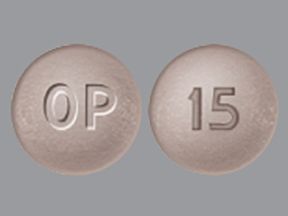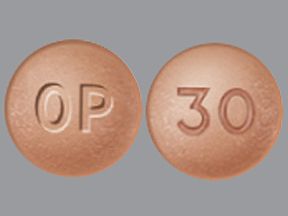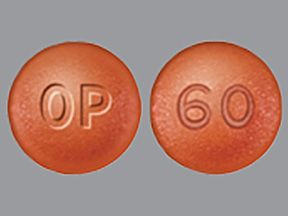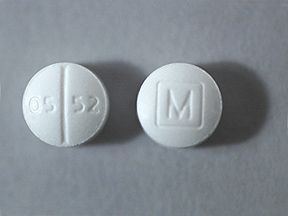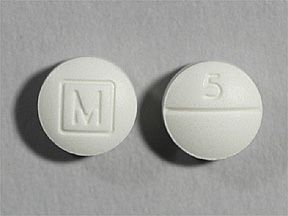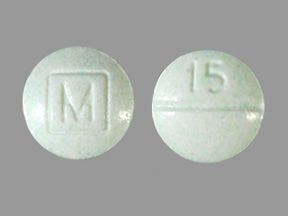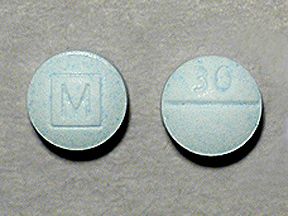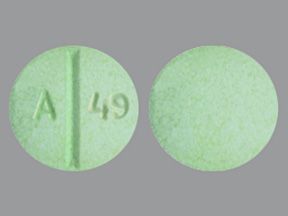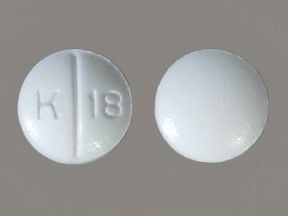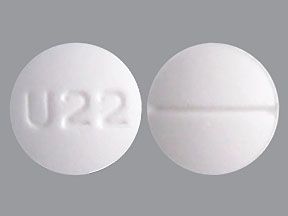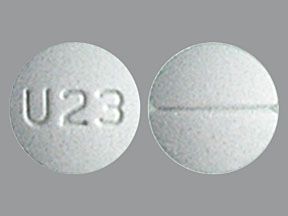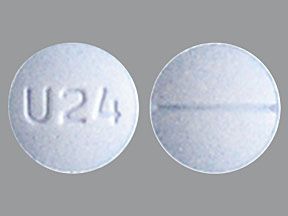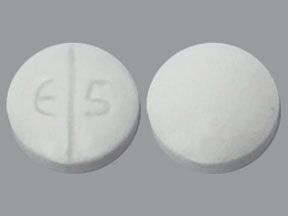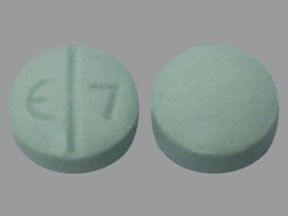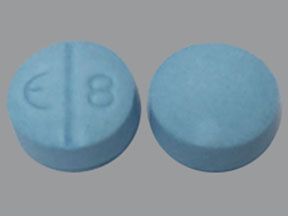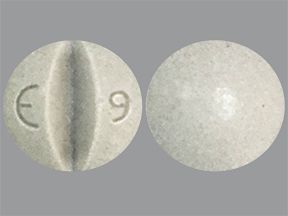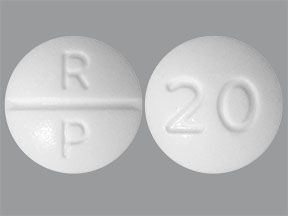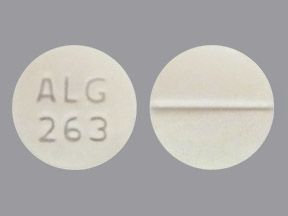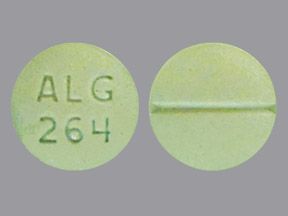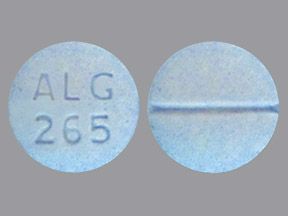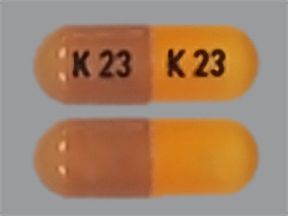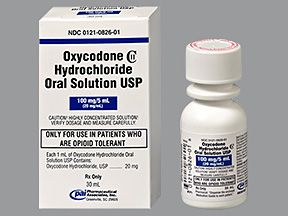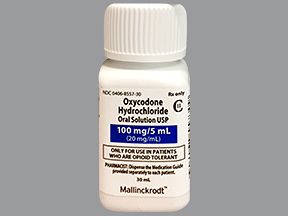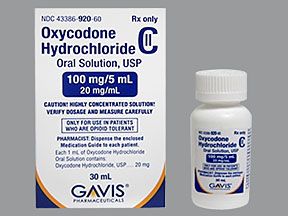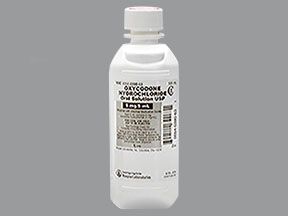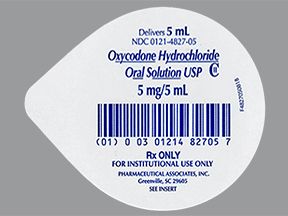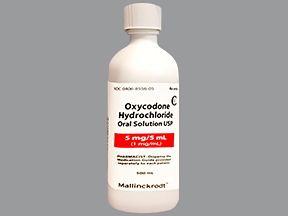If you’re experiencing severe pain, your doctor may discuss oxycodone IR oral tablets with you.
This is a prescription drug that’s used in adults to manage pain that’s severe enough to need an opioid medication. Oxycodone IR oral tablets are used when non-opioid pain treatments haven’t worked well enough or can’t be taken.
For more information about how oxycodone is used, see the “What’s oxycodone oral tablet used for?” section below.
In this article, we describe oxycodone IR oral tablet’s use, side effects, interactions, and more.
Oxycodone IR oral tablet basics
Oxycodone IR oral tablet is a generic medication that contains the drug oxycodone hydrochloride. It belongs to a group of medications called opioids.
You’ll take oxycodone IR oral tablets by swallowing them.
Oxycodone IR oral tablets are an immediate-release form of the drug. They release their contents into your body right away after you take them. This is unlike extended-release forms, which release their contents over a period of time.
Note: Oxycodone also comes in other forms. These include immediate-release capsules, extended-release tablets, extended-release capsules, and oral solution. Only oxycodone IR tablets are described in this article. If you’d like to learn about oxycodone’s other forms, talk with your doctor or pharmacist.
Oxycodone IR oral tablet brand-name versions
Oxycodone IR tablets are a generic drug that also comes in brand-name versions. These brand-name medications include Roxicodone and Oxaydo.
Note: The other forms of oxycodone have other brand-name drug versions. To learn about those other versions, talk with your doctor or pharmacist.
Oxycodone IR oral tablets are a generic drug, which means they’re an exact copy of the active drug in brand-name versions of the medication. Brand-name medications that oxycodone IR oral tablets are based on are called Oxaydo and Roxicodone.
Generic drugs are thought to be as safe and effective as the brand-name drug they’re based on. In general, generics usually cost less than brand-name drugs do.
If you’d like to know more about using Roxicodone or Oxaydo instead of oxycodone IR oral tablets, talk with your doctor. And, view this Healthline article to learn more about the differences between generic and brand-name drugs.
Your doctor will explain how you should take oxycodone IR oral tablets. They’ll also explain how much to take and how often. Be sure to follow your doctor’s instructions. Below are commonly used dosages, but always take the dosage your doctor prescribes.
Taking oxycodone IR oral tablet
You’ll take oxycodone IR tablets by swallowing them.
Oxycodone IR oral tablets are an immediate-release form of the drug. They release their contents into your body right away after you take them. This is unlike extended-release forms, which release their contents over a period of time.
Oxycodone IR oral tablet available strengths: 5 mg, 15 mg, 30 mg
Oxycodone IR oral tablets come in three strengths:
- 5 milligrams (mg)
- 15 mg
- 30 mg
Other forms of oxycodone come in other strengths. This includes generic and brand-name versions of the drug. For example, some forms of extended-release oxycodone tablets come in strengths of 10 mg, 20 mg, 40 mg, and 80 mg. If your doctor prescribes one of these doses of oxycodone, they can tell you more about your dosage and how to take it.
Dosage
Your prescribed dosage of oxycodone IR oral tablets depends on your level of pain and several other important factors. These factors include:
- whether you’ve ever taken an opioid in the past and what type of opioid you’ve taken
- the type of pain you’re having, such as acute (short-term) or chronic (lasting longer than 6 months)
- whether you’re switching to oxycodone IR tablets from another opioid drug
- your age, weight, and overall health
- any other medications you’re taking
- your risk for misuse or addiction*
The maximum dose of oxycodone your doctor prescribes depends on your condition and your health history. Your doctor will prescribe the lowest dosage for the shortest amount of time that’s effective for managing your pain. They’ll carefully monitor you while you’re taking the drug to make sure you don’t have problems with it.
* Oxycodone IR oral tablets have
Taking oxycodone IR oral tablet with other drugs
Your doctor may prescribe oxycodone IR oral tablets together with other medications to manage your pain.
You may wonder if oxycodone has acetaminophen (Tylenol) in it. You might also question if oxycodone contains ibuprofen (Advil) or another nonsteroidal anti-inflammatory drug (NSAID).
Oxycodone comes as combination products with the following non-opioid pain medications:
- acetaminophen (Tylenol)
- aspirin
If your doctor prescribes a combination oxycodone product for you, such as those listed above, do not also take doses of the individual drugs.
For example, Percocet, is a brand-name combination drug of oxycodone and acetaminophen. If you take Percocet, do not also take acetaminophen or oxycodone in any form. Doing so could lead to an overdose of either drug.
Be sure to tell your doctor about all of the pain medications you’re taking. Ask your doctor about how to safely use other pain medications with oxycodone. They can provide more information on safe dosages.
Below, we describe oxycodone use with two familiar drugs: ibuprofen and acetaminophen. Be sure to check with your doctor before taking anything with oxycodone IR oral tablets.
Oxycodone with ibuprofen
If you’re wondering whether you can take ibuprofen (Advil) with oxycodone, ask your doctor.
Combination products of oxycodone with ibuprofen used to be available for pain management. But they’re no longer available for use.
In some cases, your doctor may prescribe ibuprofen and oxycodone separately to manage your pain. But don’t take non-opioid pain medications such as ibuprofen or other NSAIDs with oxycodone, unless your doctor recommends it. Doing so could lead to serious side effects.
Be sure to ask your doctor about your pain treatment plan and how to manage your pain. Follow your doctor’s directions on how to take oxycodone IR oral tablets, with or without other medications.
Oxycodone with acetaminophen
If you’re wondering whether you can take acetaminophen (Tylenol) with oxycodone, ask your doctor.
The combination drug Percocet, which contains both oxycodone and acetaminophen, is available to manage moderate to severe pain that’s not managed by non-opioid medications. It has similar
Ask your doctor for more information about this combination medication. Be sure to let your doctor know about all of the medications you take.
If your doctor doesn’t prescribe this combination drug for you, don’t take oxycodone and acetaminophen together on your own. Doing so can lead to serious side effects including liver injury and overdose.
If your doctor does recommend that you take acetaminophen with oxycodone, you should not take any more acetaminophen or oxycodone than your doctor prescribes. Doing so could lead to serious liver injury.
Be sure to check with your doctor about your pain management plan and whether you can safely take anything with oxycodone IR oral tablets.
Questions about taking oxycodone IR oral tablet
Here’s a list of common questions related to taking oxycodone IR oral tablets.
- What if I miss a dose of oxycodone IR oral tablets? If you miss your scheduled dose of oxycodone IR tablets, take it as soon as you remember. But if it’s close to your next regular dose, skip the missed dose. Don’t take two doses of oxycodone at once. Doing so could lead to serious side effects such as slowed breathing, and even overdose.
- Will I need to use oxycodone IR oral tablets long term? There’s no set time limit for how long you can take oxycodone IR oral tablets. But your doctor will prescribe them at the lowest dosage for the shortest amount of time to help with your pain. Long-term use of opioids, such as oxycodone, can lead to dependence. (With dependence, your body needs the drug in order to feel like usual.) These drugs may also lead to misuse, and addiction.* For more information about these risks, see the “Can oxycodone oral tablets be misused?” section below.
- Can oxycodone IR oral tablets be chewed, crushed, or split? No, you should not cut, chew, or crush oxycodone IR tablets. Instead, you should swallow the tablets whole with a full glass of water. If you have trouble swallowing the tablets, ask your doctor about other pain management options. Your doctor can discuss other forms of the drug, such as the liquid solution, which may be a better option for you.
- Should I take oxycodone IR oral tablets with food? You can take oxycodone IR oral tablets with or without food. But you should
avoid taking them with grapefruit juice or any products made with grapefruit. Doing so may increase the drug’s effects and cause more side effects. Also, be sure to drink plenty of fluids and get enough fiber in your diet while you’re taking oxycodone. This will help you avoid constipation with the drug. For more information about this side effect, see the “What are some frequently asked questions about oxycodone oral tablet?” section below. - How long do oxycodone IR oral tablets take to work? How long it takes oxycodone IR oral tablets to work depends on your dosage and other individual factors. In general, the drug starts to work soon after you take it, within about 20 to 30 minutes. Your doctor can tell you more about how long it’ll take for oxycodone to work for your pain.
* Oxycodone IR oral tablets have
Questions for your doctorYou may have questions about oxycodone IR oral tablets and your treatment plan. It’s important to discuss all your concerns with your doctor.
Here are a few tips that might help guide your discussion:
- Before your appointment, write down questions such as:
- How will oxycodone IR oral tablets affect my body, mood, or lifestyle?
- Bring someone with you to your appointment if doing so will help you feel more comfortable.
- If you don’t understand something related to your condition or treatment, ask your doctor to explain it to you.
Remember, your doctor and other healthcare professionals are available to help you. They want you to get the best care possible. So, don’t be afraid to ask questions or offer feedback on your treatment.
Like most drugs, oxycodone IR oral tablets may cause mild or serious side effects. The lists below describe some of the more common side effects that oxycodone IR oral tablets may cause. These lists don’t include all possible side effects.
Keep in mind that side effects of a drug can depend on:
- your age
- other health conditions you have
- other medications you may be taking
Your doctor or pharmacist can tell you more about the potential side effects of oxycodone IR oral tablets. They can also suggest ways to help reduce side effects.
Mild side effects
Here’s a short list of some of the mild side effects that oxycodone IR oral tablets can cause. To learn about other mild side effects, talk with your doctor or pharmacist, or read oxycodone IR oral tablet’s prescribing information.
Mild side effects of oxycodone IR oral tablets that have been reported include:
Mild side effects of many drugs may go away within a few days or a couple of weeks. But if they become bothersome, talk with your doctor or pharmacist.
* For more information on this side effect, see the “Side effect focus” section below.
Serious side effects
Serious side effects from oxycodone IR oral tablets can occur, but they aren’t common. If you have serious side effects from oxycodone IR oral tablets, call your doctor right away. If you think you’re having a medical emergency, you should call 911 or your local emergency number.
Serious side effects of oxycodone IR oral tablets that have been reported include:
- very low blood pressure, which can cause dizziness and fainting
- seizures
- problems with your adrenal glands
- heart problems, such as increased heart rate and palpitations
- drug dependence (a condition in which your body is used to the drug and needs it in order to feel like usual)
- withdrawal symptoms; see the “What are some frequently asked questions about oxycodone oral tablet?” section below for more information
- boxed warnings:*
- respiratory depression (slow or shallow breathing)
- overdose from accidental ingestion
- serious risks if taken with certain drugs
- neonatal opioid withdrawal syndrome (NOWS)
- allergic reaction*
* For more information on this side effect, see the “Side effect focus” section below.
SUICIDE PREVENTIONIf you think someone is at immediate risk of self-harm or hurting another person:
- Call 911 or your local emergency number.
- Stay with the person until help arrives.
- Remove any guns, knives, medications, or other things that may cause harm.
- Listen, but don’t judge, argue, threaten, or yell.
If you or someone you know is considering suicide, get help from a crisis or suicide prevention hotline. Try the National Suicide Prevention Lifeline at 800-273-8255.
Side effect focus
Learn more about some of the side effects oxycodone IR oral tablet may cause.
Boxed warnings
Oxycodone IR oral tablets have boxed warnings about certain risks. Boxed warnings are serious warnings from the Food and Drug Administration (FDA). The drug’s boxed warnings are described below.
Addiction and misuse. Taking oxycodone IR oral tablets can increase the risk of misuse and addiction. Misuse happens when a drug is taken differently than how it’s prescribed. Addiction happens when a drug is taken even though it may cause harmful outcomes.
Respiratory depression. Taking oxycodone IR tablets can cause respiratory depression. This condition is a serious breathing problem that causes shallow or slowed breathing. Respiratory depression can be life threatening, and in some cases, fatal. This risk is higher for people with lung problems, such as chronic obstructive pulmonary disease (COPD).
Risk of overdose with accidental ingestion. Accidentally taking oxycodone IR tablets can cause drug overdose. This is especially dangerous in children who accidentally ingest the drug. This risk is higher in people who’ve never taken an opioid, such as oxycodone, in the past.
Neonatal opioid withdrawal syndrome (NOWS). Taking oxycodone IR tablets during pregnancy may increase the risk of NOWS in a fetus. This means the baby may have opioid withdrawal symptoms after their birth. For more information about this warning see “Pregnancy and breastfeeding” in the “What should be considered before taking oxycodone oral tablet?” section below.
Risks if used with certain drugs. Taking oxycodone IR oral tablets with other central nervous system (CNS) depressant drugs, such as benzodiazepines, can increase the risk of CNS depression. (With CNS depression, you have slowed brain function.) CNS depression can cause severe drowsiness, breathing problems, and coma. In some cases, it can cause death. Additionally, taking oxycodone IR oral tablets with drugs that affect a certain enzyme (type of protein) may change the level of oxycodone in your body. Depending on how the drug affects the enzyme, this can lead to an increase or a decrease in the effects of oxycodone.
What might help
Oxycodone IR oral tablets can increase your risk for certain serious side effects. This is why the Food and Drug Administration (FDA) requires all opioid pain medications, including oxycodone, have a
Under a REMS program, your doctor and pharmacist must evaluate the risks versus benefits of using an opioid for your condition. They must provide specific counseling to you about all the risks of taking the drug. This includes the risk of misuse and addiction. To learn more about misuse and addiction, see the “Can oxycodone oral tablet be misused?” section below.
Your doctor must also tell you how to safely store and dispose of expired or unused oxycodone. This helps to prevent accidental ingestion and overdose. You should store oxycodone in a secure location, away from children. Your doctor may also recommend that you have naloxone (Narcan) available. This medication helps reverse an opioid overdose if it’s available and can be given in time.
Before taking oxycodone IR oral tablets, be sure to tell your doctor if you have:
- experienced misuse or have a substance use disorder, including alcohol use disorder
- family members who’ve had or have substance misuse or addiction
- any mental health conditions, such as depression
- any lung problems, including asthma or chronic obstructive pulmonary disease (COPD)
Tell your doctor about all of your medications, including any CNS depressants, such as benzodiazepines. See the “What should be considered before taking oxycodone oral tablet?” section below for more information on possible drug interactions with oxycodone.
While you’re taking this drug, your doctor will carefully manage your dosage and monitor how your body does. They’ll watch you especially closely when you first start taking the drug and with any dosage changes.
If you have questions about these boxed warnings, ask your doctor for more information. They can discuss with you the risks and benefits of oxycodone use.
Sleepiness
You may have sleepiness when you take oxycodone IR oral tablets. This is a common side effect of the drug. How much sleepiness affects you depends on individual factors such as your age, overall health, and genetics. It also varies with whether you’re taking other medications that cause sleepiness.
Sleepiness may affect your ability to do certain tasks that require you to be mentally alert. Being extremely sleepy along with other symptoms, such as slow breathing, may indicate overdose.
What might help
If you’re feeling sleepy with oxycodone, be careful with any tasks that require alertness, such as driving. You should be very cautious, especially when you first start taking the drug and for as long as sleepiness continues.
If sleepiness doesn’t go away, call your doctor. They can discuss whether it’s safe for you to keep taking this drug.
If you have severe sleepiness, along with trouble breathing or low blood pressure, call 911 and get medical help right away. Excessive sleepiness with these other symptoms may be a sign of overdose. Getting medical care right away is critical for your safety.
Itchiness
Oxycodone may cause your skin to feel itchy. This is a common side effect of the drug.
But, if you’re having severe itching, with skin rash and flushing, you may be having a serious allergic reaction to oxycodone. (With flushing, you have temporary warmth, redness, or deepening of skin color.) See the section just below called “Allergic reaction” for more information.
What might help
If you have itchiness with oxycodone IR oral tablets, talk with your doctor. They may want to know more about your reaction.
If your itchiness isn’t due to a drug allergy, your doctor may recommend over-the-counter products that will soothe the itchiness. If it’s due to an allergy, your doctor will manage it as needed.
Ask your doctor for more information about this side effect.
Allergic reactionSome people may have an allergic reaction to oxycodone IR oral tablets.
Symptoms of a mild allergic reaction can include:
- skin rash
- itchiness
- flushing (temporary warmth, redness, or deepening of skin color)
A more severe allergic reaction is rare but possible. Symptoms of a severe allergic reaction can include swelling under your skin, typically in your eyelids, lips, hands, or feet. They can also include swelling of your tongue, mouth, or throat, which can cause trouble breathing.
Call your doctor right away if you have an allergic reaction to oxycodone IR oral tablets. But if you think you’re having a medical emergency, call 911 or your local emergency number.
Oxycodone IR oral tablets and hydrocodone are both prescription opioid medications. They have some similar uses and some differences.
For instance, they’re both used to treat moderate to severe pain that can’t be managed with non-opioid medications. Both drugs have similar side effects, interactions, and warnings. These drugs come in multiple forms, and the dosage of each depends on:
- the type of pain you’re having
- your age, weight, and overall health
- any other medications you may be taking
To learn more about how oxycodone and hydrocodone compare, see this article.
Read on to find out about other alternatives of oxycodone. Be sure to talk with your doctor about which drug is right for your condition.
Oxycodone vs. OxyContin
Oxycodone and Oxycontin are both opioids. They’re both used to treat moderate to severe pain that’s not managed by non-opioid drugs.
Oxycodone IR is a generic medication that’s an immediate-release form. Oxycontin is brand-name drug, that’s an extended-release form.
Immediate-release forms release their contents into your body right away after you take them. This is unlike extended-release forms, which release their contents over a period of time. Extended-release drugs are usually taken less often than immediate-release drugs are.
If you’d like to know more about the similarities and differences of oxycodone and OxyContin, check out this side-by-side comparison.
Oxycodone vs. tramadol
Like oxycodone, tramadol is an opioid. And it’s also used to treat moderate to severe pain that needs treatment with an opioid.
To see a detailed breakdown of these two medications, see this article.
Oxycodone vs. Percocet
Percocet is a brand-name drug that’s made with both oxycodone with acetaminophen (Tylenol). It’s used to treat moderate to severe pain, as are oxycodone IR oral tablets.
Additionally, Percocet can manage a fever that’s happening along with pain. And it’s used to treat breakthrough pain (pain that’s not managed by long-acting pain medications).
Check out this article to see an overview of how oxycodone and Percocet differ and are alike.
Oxycodone vs. Dilaudid
Dilaudid is a brand-name drug that contains hydromorphone hydrochloride. Like oxycodone, it’s an opioid drug.
Hydromorphone is a stronger drug than oxycodone. It’s generally used to treat severe pain that’s related to either cancer or certain types of surgery, such as operations on broken bones.
To learn more about oxycodone and Dilaudid, see this detailed comparison.
Find answers to some commonly asked questions about oxycodone IR oral tablets.
What’s the half-life of oxycodone? How long does it stay in your system and last? And how long does it stay in urine?
The half-life of oxycodone is around 4 hours. This means it takes 4 hours for your body to clear half of a dose of oxycodone.
How long oxycodone can stay in your system depends on individual factors, such as:
- any other medications you may be taking
- your age
- your genetics
How long the drug stays in your system can also vary depending on your overall health, including how well your liver and kidneys function. If you have liver or kidney problems, it may take longer for your body to clear oxycodone.
Oxycodone may stay in your urine and show up on urine screens for up to 3 or 4 days after your last dose. If you’ll be having a urine drug screen while you’re taking this medication, be sure to tell the person giving the test to you.
Ask your doctor if you’d like more information about how long oxycodone lasts in your system.
Does stopping oxycodone cause withdrawal? If so, what are possible withdrawal symptoms of oxycodone?
Yes, suddenly stopping oxycodone after you’ve been taking it for some time may cause withdrawal symptoms. Your risk for withdrawal symptoms is higher if you’ve been taking high doses of oxycodone IR oral tablets for several weeks or longer.
It’s possible that your body can become physically dependent on oxycodone. This means your body needs the drug in order to function like usual. This is why suddenly stopping the drug after you’ve been taking it for some time may lead to withdrawal.
Symptoms of withdrawal from oxycodone IR oral tablets may include:
- nausea, vomiting, or diarrhea
- restlessness
- excessive sweating
- runny nose
- belly cramps or pain
- muscle aches
- fast heart rate
- high blood pressure
Be sure to talk with your doctor before stopping oxycodone IR oral tablets. If you need to stop taking the drug, your doctor will make a schedule to have you slowly stop taking oxycodone. Doing so will help to prevent withdrawal symptoms.
Is oxycodone similar to Vicodin, Norco, or Nucynta?
Vicodin, Norco, and Nucynta are all brand-name opioid drugs. Vicodin and Norco each contain a combination of acetaminophen and hydrocodone. Nucynta contains the active drug tapentadol.
These medications have some similarities and a few differences. They’re all used to treat pain that’s severe enough to require treatment with an opioid.
Vicodin and Norco can treat pain, but they can also treat a fever that’s happening along with pain.
Vicodin, Norco, and Nucynta have similar side effects and warnings. But they come in different strengths and have differing dosages.
If you’d like to learn more about these medications, talk with your doctor. They can tell you which medication is best to manage your condition.
Does oxycodone expire?
Yes, oxycodone tablets have an expiration date based on when they’re dispensed from your pharmacy. Your pharmacist can provide more information about when your oxycodone IR tablets will expire. In most cases, this may be up to 1 year from the date the medication is dispensed.
Be sure to store this medication in a secure location, away from light, heat, and moisture. Follow you pharmacist’s recommendation about when your prescription expires.
What can I do to help relieve constipation with oxycodone?
Constipation is one of the most common side effects of opioids, including oxycodone.
This is because opioids work by blocking pain receptors in your brain. (Receptors are attachments sites for chemicals that send messages in your body.) But, the receptors oxycodone affects are also found in your digestive tract. So, oxycodone slows the time it takes for stool to pass through your bowels.
If you have constipation while you’re taking oxycodone, you can try some at-home ways to manage this side effect. You could also ask your doctor about over-the-counter products, such as stool softeners. In some cases, your doctor may prescribe treatment such as naloxegol (Movantik) or Amitiza (lubiprostone).
Ask your doctor for more information on how to treat constipation from oxycodone. Be sure to check with your doctor before taking any treatments for constipation from oxycodone.
Note: Oxycodone may not be safe for you to take if you have any gastrointestinal (GI) problems. These could include conditions such as paralytic ileus (slowed movement in your intestines that may lead to blockage) and chronic (long-lasting) constipation. This is because oxycodone may worsen your GI problems. If you have a history of GI problems, tell your doctor. They’ll recommend if you can safely take oxycodone.
Can I take other pain medications together with oxycodone?
Maybe. Oxycodone is available as a combination drug with certain non-opioid pain medications, including aspirin and acetaminophen (Tylenol). But you shouldn’t take any pain medications with oxycodone on your own. Doing so can increase your risk for serious side effects.
Your doctor will discuss your pain management plan and they’ll tell you about the safety of using other medications with oxycodone. Follow your doctor’s exact directions for your pain treatment. Only take medications with oxycodone if your doctor recommends doing so.
To learn more about using oxycodone with other pain medications, see “Taking oxycodone IR oral tablet with other drugs” in the “How is oxycodone oral tablet taken?” section above.
Before starting treatment with oxycodone IR oral tablets, let your doctor know if you:
- have any health conditions
- are taking any other medications*
- have experienced misuse or addiction*
- have mood or other mental health disorders, such as depression
- have ever had suicidal thoughts or actions
These and other considerations are described below.
* Oxycodone IR oral tablets have
Interactions
Taking medications, vaccines, foods, and other things with a certain drug can affect how the drug works. These effects are called interactions.
Before taking oxycodone IR oral tablets, be sure to tell your doctor about all medications you take, including prescription and over-the-counter types. Also describe any vitamins, herbs, or supplements you use. Your doctor or pharmacist can tell you about any interactions these items may cause with oxycodone IR oral tablet.
The lists below do not contain all types of drugs that may interact with oxycodone IR oral tablets. Your doctor or pharmacist can tell you more about these interactions and any others that may occur with use of oxycodone IR oral tablets.
Interactions with drugs and supplements
Oxycodone IR oral tablets can interact with several types of drugs.
This medication also has a boxed warning regarding risks if it’s used with certain other drugs. Boxed warnings are serious warnings from the Food and Drug Administration (FDA). These boxed warnings are described below.
Oxycodone IR oral tablets may interact with other medications, herbs, or supplements beside those listed below. Be sure to talk with your doctor before taking anything with oxycodone.
Boxed warning for use with central nervous system depressants. Taking oxycodone IR oral tablets with other central nervous system (CNS) depressant drugs, such as benzodiazepines, can increase the risk of CNS depression. (With CNS depression, you have slowed brain function.) CNS depression can cause severe drowsiness, breathing problems, and coma. In some cases, it can cause death.
Examples of CNS depressants include:
- benzodiazepines, such as alprazolam (Xanax)
- opioids other than oxycodone, including and tramadol and morphine
- antipsychotics, such as chlorpromazine
- sleep medications, such as zolpidem (Ambien)
- muscle relaxants, such as cyclobenzaprine
- anticholinergic drugs, such as propantheline and scopolamine
- monoamine oxidase inhibitor (MAOI) antidepressants
- selective serotonin reuptake inhibitor (SSRI) antidepressants
- anesthetics, such as butorphanol, nalbuphine, and pentazocine
- alcohol, which is described below in the “Oxycodone IR oral tablet and alcohol” section
Boxed warning for use with drugs that affect a certain enzyme. Additionally, taking oxycodone IR oral tablets with drugs that affect a certain enzyme (type of protein), called CYP3A4, may impact the effects of oxycodone.
Drugs that inhibit (block the action of) the CYP3A4 enzyme can increase the effects of oxycodone. This can lead to increased risk of side effects, and even cause respiratory depression (slowed breathing). In some cases, respiratory depression may be fatal.
Examples of drugs that inhibit CYP3A4 are listed below. But this isn’t a complete list of all possible drugs with this interaction. Examples include:
- the antibiotics erythromycin
- the antifungal called ketoconazole
- the antiviral ritonavir
- heart arrhythmia drugs, such as amiodarone
- St. John’s wort and other herbs*
* Be sure to check with your doctor or pharmacist before taking any herbs and supplements with oxycodone. Some of these products may cause a serious reaction if taken with oxycodone IR oral tablets.
Drugs that induce (increase the activity of) the CYP3A4 enzyme can decrease the effects of oxycodone. This can lead to decreased oxycodone levels in your body, lowering the effectiveness of oxycodone. It may even lead to feelings of withdrawal if you have developed physical dependence to oxycodone. (With dependence, your body needs the drug in order for you to feel like usual.)
Additionally, if you’re taking oxycodone and a drug that induces CYP3A4, you can have an increased level of oxycodone and its side effects if you stop taking the drug that induces CYP3A4.
Examples of drugs that induce CYP3A4 are listed below. But this isn’t a complete list of all possible drugs with this interaction. Examples include:
- the antibiotic rifampin
- the seizure drugs called carbamazepine and phenytoin
- the cystic fibrosis drug lumacaftor
Boxed warnings
Oxycodone IR oral tablets have boxed warnings about certain risks. Boxed warnings are serious warnings from the Food and Drug Administration (FDA). The drug’s boxed warnings are described below.
Addiction and misuse. Taking oxycodone IR oral tablets can increase the risk of misuse and addiction. Misuse happens when a drug is taken differently than how it’s prescribed. Addiction happens when a drug is taken, even though it may cause harmful outcomes. To learn more about this warning, see the “Can oxycodone oral tablet be misused?” section below.
Respiratory depression. Taking oxycodone IR tablets can cause respiratory depression. This condition is a serious breathing problem that causes shallow or slowed breathing. Respiratory depression can be life threatening, and in some cases, fatal. This risk is higher for people with lung problems, such as chronic obstructive pulmonary disease (COPD). For more information, see the “What are oxycodone oral tablet’s side effects?” section above.
Risk of overdose with accidental ingestion. Accidentally taking oxycodone IR tablets can cause drug overdose. This is especially dangerous in children who accidentally ingest the drug. This risk is higher in people who’ve never taken an opioid, such as oxycodone, in the past. For more information about this risk, see the “What are oxycodone oral tablet’s side effects?” section above.
Neonatal opioid withdrawal syndrome (NOWS). Taking oxycodone IR tablets during pregnancy may increase the risk of NOWS in a fetus. This means the baby may have opioid withdrawal symptoms after their birth. For more information about this warning see “Pregnancy and breastfeeding” below.
Risks if used with certain drugs. Taking oxycodone IR oral tablets with other central nervous system (CNS) depressant drugs, such as benzodiazepines, can increase the risk of CNS depression. (With CNS depression, you have slowed brain function.) CNS depression can cause severe drowsiness, breathing problems, and coma. In some cases, it can cause death. Additionally, taking oxycodone IR oral tablets with drugs that affect a certain enzyme (type of protein) may impact the effects of oxycodone. To see examples of drugs that interact with oxycodone IR oral tablets, see “Interactions” above.
Other warnings
Oxycodone IR oral tablets may not be right for you if you have certain medical conditions or other factors that affect your health. Talk with your doctor about your health history before you take oxycodone IR oral tablets. Factors to consider include those in the list below.
- Lung or breathing problems. If you have certain types of lung disorders or breathing problems, taking oxycodone may increase your risk for respiratory depression (slow or shallow breathing). This includes conditions such as chronic obstructive pulmonary disease (COPD), asthma, or sleep apnea. Before taking oxycodone, tell your doctor if you have any lung or breathing conditions. Your doctor will let you know if it’s safe for you to take this drug.
- Allergic reaction. If you’ve had an allergic reaction to oxycodone IR oral tablets or any of their ingredients, you shouldn’t take the tablets. Ask your doctor what other medications are better options for you.
- Brain injury or brain tumors. Oxycodone can increase pressure in your brain. If you’ve ever had a brain injury or brain tumor, oxycodone may not be safe for you to take. Before taking this drug, tell your doctor about any head injuries or other problems with your brain. They’ll let you know if you can take oxycodone.
- Seizure disorders. If you have epilepsy or have ever had seizures, tell your doctor before taking oxycodone. This drug may increase your risk of seizures. Your doctor can provide more information. They can tell you if it’s safe for you to take oxycodone.
- Gastrointestinal problems. If you have paralytic ileus (slowed movement in your intestines that may lead to blockage) or any other problems with your gastrointestinal (GI) tract, oxycodone may not be safe for you. Talk with your doctor about any GI problems you have so they can discuss the risks and safety of oxycodone for you.
- Liver conditions. If you have serious problems with your liver, oxycodone may not be safe for you to take. This is because your body may not be able to clear the drug properly from your system. This can increase your risk for side effects from the drug. In some cases, other medications you’re taking may also increase liver related side effects. Your doctor will check your liver function before prescribing oxycodone to you. Tell them if you’ve had hepatitis or any other serious liver problems in the past. Your doctor will monitor your liver function while you’re taking oxycodone. Tell them about all your medications as well.
- Adrenal gland disorder. If you have Addison’s disease or other problems with your adrenal glands, oxycodone may not be right for you. Oxycodone may make your condition worse, and you may also have more side effects from the drug. Talk with your doctor if you have any adrenal gland conditions. Your doctor can tell you if it’s safe for you to take oxycodone.
- Hypothyroidism. If you have hypothyroidism (a condition in which your body doesn’t make enough thyroid hormones), oxycodone may worsen your condition. You may also experience more side effects of oxycodone than usual if you have this condition. Tell your doctor if you have any problems with your thyroid. They can discuss with you the risks of taking oxycodone.
- Urinary problems. If you have certain urinary conditions, oxycodone could make your problem worsen. This includes an enlarged prostate or a bladder blockage. You may have trouble urinating if you take oxycodone. Before taking this drug, tell your doctor if you have problems urinating. They can discuss if oxycodone is safe for you to take.
- Pancreas and gallbladder conditions. If you’ve ever had gallbladder problems or pancreatitis (inflammation of your pancreas), oxycodone may make these conditions worse. Taking oxycodone increases your risk for having pancreatitis. So, the drug may not be safe for you to take. Ask your doctor for more information about this.
Oxycodone IR oral tablet and alcohol
If you drink alcohol, do not drink it while you’re taking oxycodone IR oral tablets.
Alcohol is considered a central nervous system (CNS) depressant. Oxycodone IR oral tablets have a
CNS depressants can increase the risk of CNS depression. With CNS depression, you have slowed brain function. CNS depression can cause severe drowsiness, breathing problems, and coma. In some cases, it can cause death.
Drinking alcohol while you’re taking oxycodone IR oral tablets can increase your risk of serious side effects. These include:
- dizziness
- drowsiness
- confusion
- respiratory depression (slow or shallow breathing)
- coma
- in rare cases, death
Ask your doctor for more information about this interaction between alcohol and oxycodone. They can tell you about the risks of drinking alcohol while you’re taking oxycodone.
Pregnancy and breastfeeding
If you’re pregnant or breastfeeding, tell your doctor before taking oxycodone. They’ll discuss if it’s safe for you to take this medication.
Oxycodone and pregnancy
Using oxycodone during pregnancy may cause the baby to develop opioid dependence. (With dependence, their body needs the drug in order for them to feel like usual.) This condition is called neonatal opioid withdrawal syndrome (NOWS).
If your baby has NOWS, they’ll have opioid withdrawal symptoms after birth. NOWS requires treatment in the hospital. Some possible symptoms of NOWS include:
- tremors
- diarrhea and vomiting
- unusual crying and irritability
- inability to gain weight
- trouble sleeping
Oxycodone IR oral tablets have a
Oxycodone and breastfeeding
Oxycodone IR oral tablets may pass into breast milk. So, taking the drug while breastfeeding can increase the risk of certain side effects in a child who’s breastfed.
These side effects include:
- severe drowsiness
- respiratory depression (slow or shallow breathing)
Ask your doctor for more information about the safety of taking oxycodone while breastfeeding. They can tell you about other ways to feed your child if you need to take oxycodone.
Oxycodone IR tablets have
Misuse happens when a medication is taken differently than how it’s prescribed. Addiction happens when a medication is taken even though it’s causing harmful outcomes.
Misusing oxycodone IR oral tablets to get “high” can cause you to overdose with the drug. Overdose can be life threatening, and even fatal.
You should take oxycodone IR tablets exactly as directed by your doctor. This means you should swallow the tablets by mouth. Don’t alter the tablets by snorting them or taking them in a way other than how your doctor instructed. Doing so is very dangerous and can lead to an overdose, and even death.
If you’re experiencing breakthrough pain or you don’t feel that oxycodone is working well enough to treat your pain, call your doctor. They can review your treatment plan and discuss pain management options.
To learn more about how oxycodone IR tablets are used for pain, see the “What is oxycodone oral tablet used for?” section above. To learn about the boxed warnings of oxycodone IR oral tablets, see the “What are oxycodone oral tablet’s side effects?” section above.
Don’t take more oxycodone IR oral tablets than your doctor prescribes. Using more than this can lead to serious side effects such as overdose.
Overdose with oxycodone may be life threatening. If overdose isn’t quickly reversed, it can lead to death. It’s important to get emergency medical attention right away if you or someone you know has an oxycodone overdose.
Symptoms of overdose
Symptoms of oxycodone overdose can include:
- slowed breathing
- severe drowsiness
- being unconscious
- very low blood pressure
- coma
- in some cases, death
What to do in case you take too much oxycodone IR oral tablet
Call your doctor if you think you’ve taken too much oxycodone. You can also call 800-222-1222 to reach the American Association of Poison Control Centers, or use its online resource. If you have severe symptoms, immediately call 911 (or your local emergency number) or go to the nearest emergency room.
If you’re experiencing severe pain, your doctor may recommend oxycodone IR tablet.
It’s a prescription drug that’s used in adults to manage pain that’s severe enough to need an opioid medication. This drug is used when non-opioid pain treatments haven’t worked well enough or can’t be used.
Oxycodone works to manage pain by binding to certain receptors (attachment sites) in your brain. By blocking these receptors, oxycodone prevents pain signals from being sent to your body from your brain.
Your doctor can tell you about all the uses of oxycodone and if it’s safe for you to take based on your overall health.
Costs of prescription drugs can vary depending on many factors. These factors include what your insurance plan covers and which pharmacy you use.
Financial assistance to help you pay for oxycodone IR oral tablets may be available. Medicine Assistance Tool and NeedyMeds are two websites that provide resources to help reduce the cost of oxycodone IR oral tablet.
These websites also offer tools to help you find low-cost healthcare and certain educational resources. To learn more, visit their websites.
If you’re experiencing severe pain that’s not managed with non-opioid medications, your doctor may discuss oxycodone with you. To learn more about how oxycodone IR tablets are used for pain, see the “What is oxycodone oral tablet used for?” section above.
You may have questions about taking oxycodone for pain. Here are a few questions to consider asking your doctor:
- Is it safe to take oxycodone IR oral tablets for chronic (long-lasting) pain?
- For how long can I take oxycodone IR oral tablets?
- What can I expect when I start treatment with oxycodone IR oral tablets?
- Is oxycodone the best option for treating my pain?
- Is there a difference between oxycodone IR tablets and capsules?
To learn more about treatment options for chronic pain, see this Healthline article. You can also read this Healthline article to learn more about pain and options to manage it.
Q:
Should I carry naloxone (Narcan) with me while I’m taking oxycodone?
AnonymousA:
It’s always a good idea to have Narcan with you if you’re taking an opioid, such as oxycodone. Narcan is used to reverse opioid overdose.
If you’re taking an opioid as prescribed by your doctor, you have a low risk of opioid overdose. But, certain behaviors could increase your risk of overdose with opioids. These include:
- taking more of the opioid than your doctor has recommended or taking it more often than prescribed
- missing doctor appointments during treatment or not telling your doctor:
- about side effects you’re having from the opioid
- if your pain is or isn’t well managed with the opioid
This risk may also be increased if you’re taking other central nervous system (CNS) depressant drugs, including alcohol, with oxycodone. CNS depressants can increase the risk of CNS depression. (With CNS depression, you have slowed brain function.)
Oxycodone IR oral tablets have a
If your doctor prescribes oxycodone for you, talk with them about your risk for overdose. Ask if having Narcan with you is recommended.
The Healthline Pharmacist TeamAnswers represent the opinions of our medical experts. All content is strictly informational and should not be considered medical advice.Disclaimer: Healthline has made every effort to make certain that all information is factually correct, comprehensive, and up to date. However, this article should not be used as a substitute for the knowledge and expertise of a licensed healthcare professional. You should always consult your doctor or another healthcare professional before taking any medication. The drug information contained herein is subject to change and is not intended to cover all possible uses, directions, precautions, warnings, drug interactions, allergic reactions, or adverse effects. The absence of warnings or other information for a given drug does not indicate that the drug or drug combination is safe, effective, or appropriate for all patients or all specific uses.

